Unit 7 The Birthday Topic 1 When is your birthday? Listening & Speaking 课件(共21张PPT)
文档属性
| 名称 | Unit 7 The Birthday Topic 1 When is your birthday? Listening & Speaking 课件(共21张PPT) |
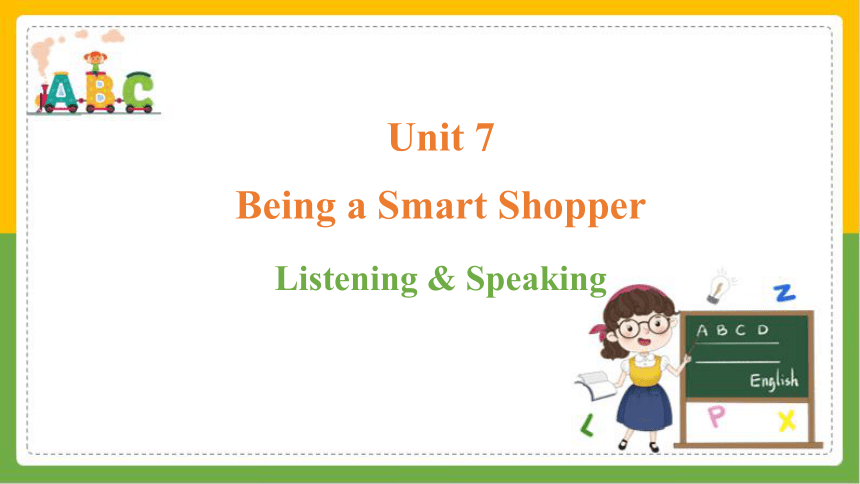
|
|
| 格式 | pptx | ||
| 文件大小 | 63.9MB | ||
| 资源类型 | 教案 | ||
| 版本资源 | 仁爱科普版 | ||
| 科目 | 英语 | ||
| 更新时间 | 2025-01-18 22:35:37 | ||
图片预览

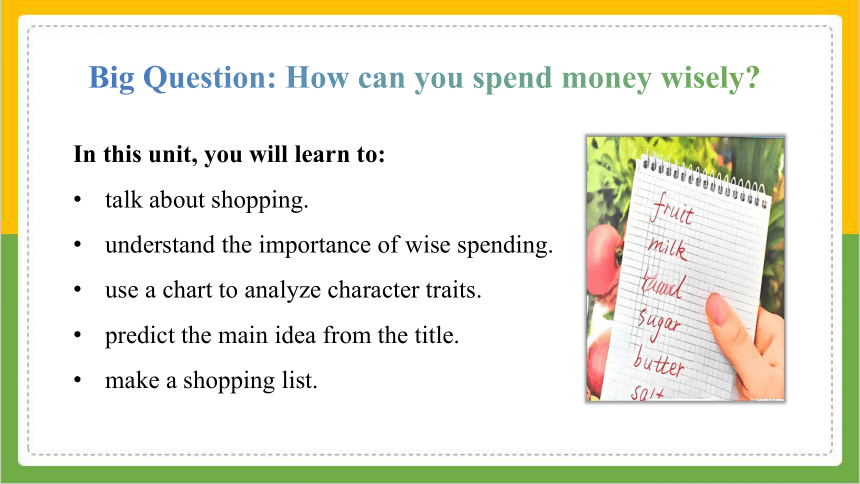
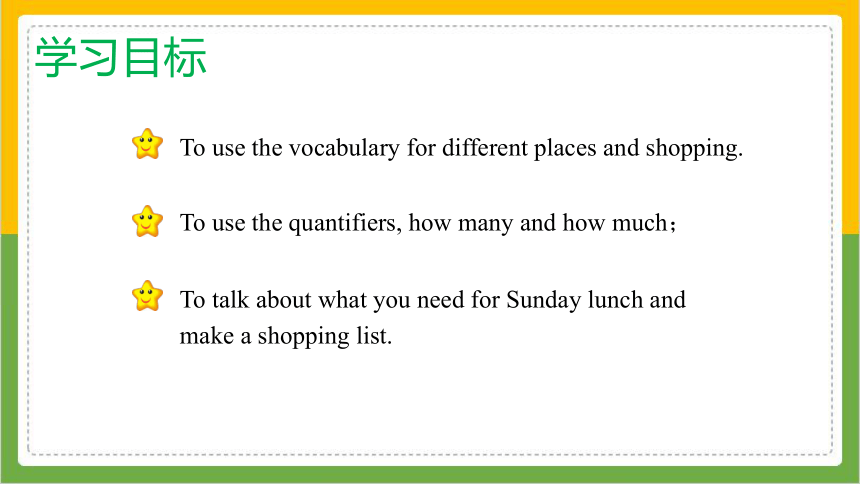
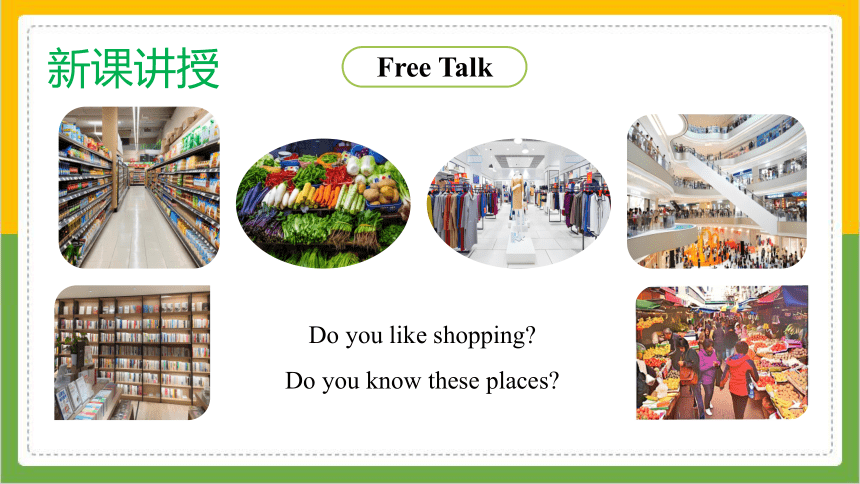
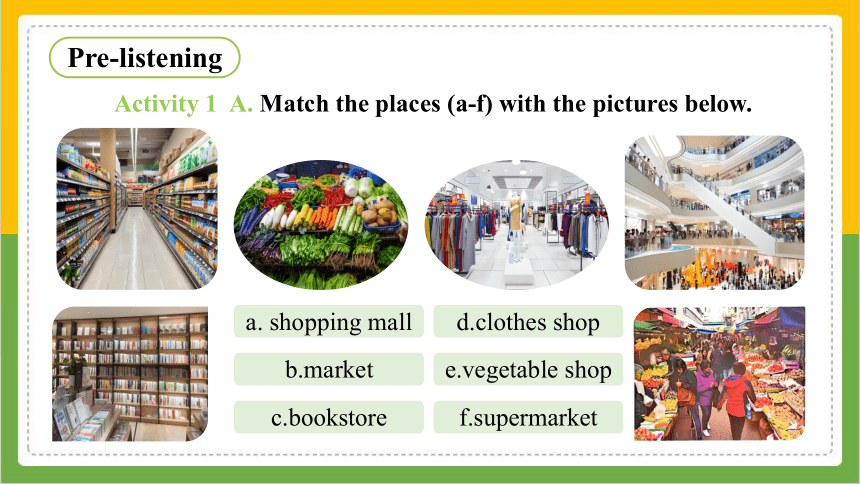
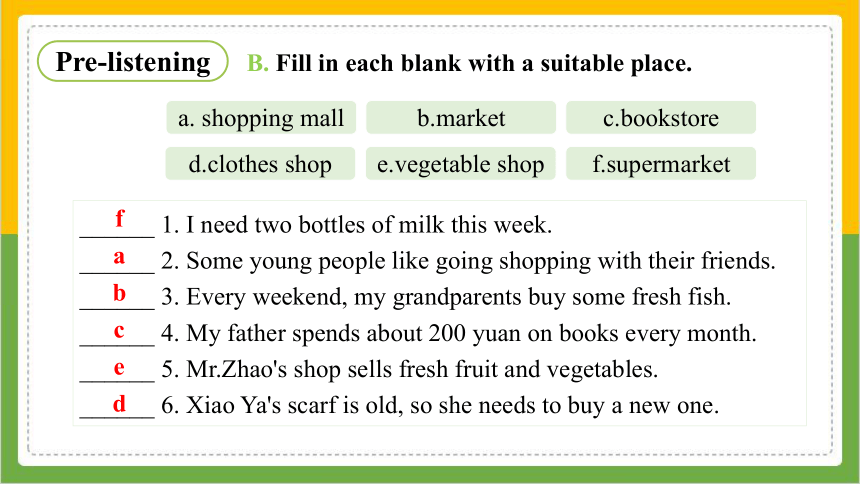
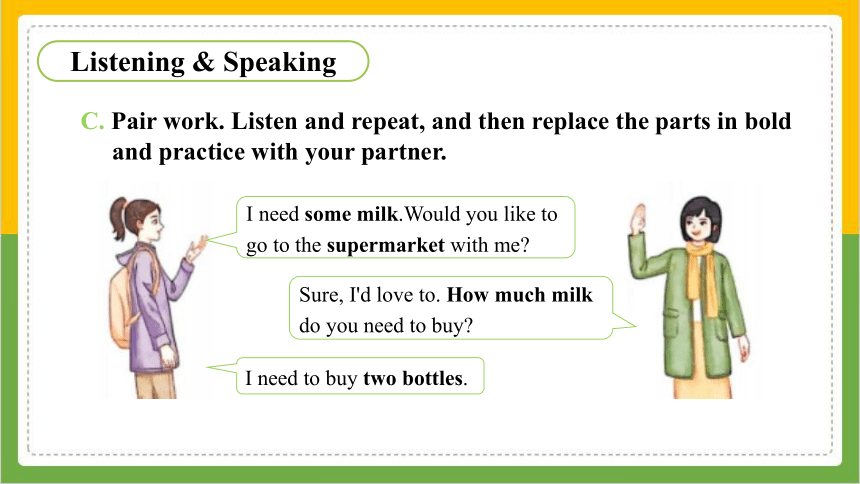
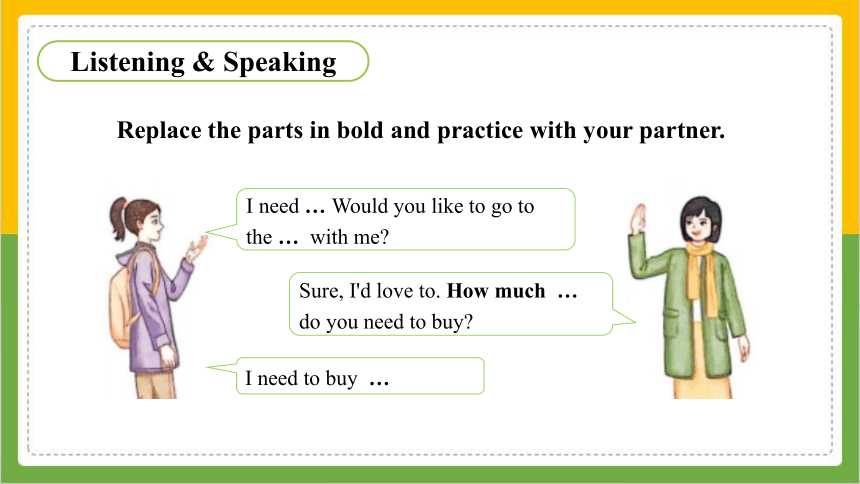
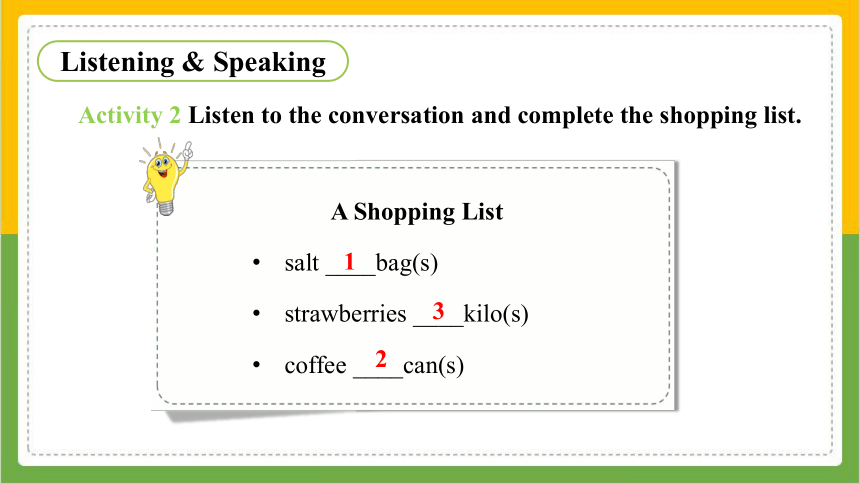
文档简介
(共21张PPT)
Listening & Speaking
Unit 7
Being a Smart Shopper
Big Question: How can you spend money wisely
In this unit, you will learn to:
talk about shopping.
understand the importance of wise spending.
use a chart to analyze character traits.
predict the main idea from the title.
make a shopping list.
学习目标
To use the vocabulary for different places and shopping.
To use the quantifiers, how many and how much;
To talk about what you need for Sunday lunch and
make a shopping list.
Do you like shopping
Do you know these places
新课讲授
Free Talk
Activity 1 A. Match the places (a-f) with the pictures below.
Pre-listening
a. shopping mall
b.market
c.bookstore
d.clothes shop
e.vegetable shop
f.supermarket
B. Fill in each blank with a suitable place.
Pre-listening
______ 1. I need two bottles of milk this week.
______ 2. Some young people like going shopping with their friends.
______ 3. Every weekend, my grandparents buy some fresh fish.
______ 4. My father spends about 200 yuan on books every month.
______ 5. Mr.Zhao's shop sells fresh fruit and vegetables.
______ 6. Xiao Ya's scarf is old, so she needs to buy a new one.
a. shopping mall
b.market
c.bookstore
d.clothes shop
e.vegetable shop
f.supermarket
f
a
b
c
e
d
C. Pair work. Listen and repeat, and then replace the parts in bold
and practice with your partner.
Listening & Speaking
I need some milk.Would you like to go to the supermarket with me
I need to buy two bottles.
Sure, I'd love to. How much milk do you need to buy
Replace the parts in bold and practice with your partner.
Listening & Speaking
I need … Would you like to go to the … with me
I need to buy …
Sure, I'd love to. How much … do you need to buy
Activity 2 Listen to the conversation and complete the shopping list.
A Shopping List
salt ____bag(s)
strawberries ____kilo(s)
coffee ____can(s)
1
3
2
Listening & Speaking
Listen again and fill in the blanks.
A: There isn't any _____ at home.
B: And we don't have any salt.
A: Let's make a shopping list and go to the ___________ then.
B: Sure.What do we need
A: Let me see. We need some salt, coffee and strawberries.
B: _______________ do we need
A: We need one bag of salt.
B: ____________________ should we buy
A: We should buy three kilos of strawberries.
B: Coffee
A: ___________ two cans of coffee
B: OK.
Listening & Speaking
fruit
supermarket
How much salt
How many strawberries
What about
Practice the conversation with your partner.
Listening & Speaking
A:There isn't any fruit at home.
B:And we don't have any salt.
A:Let's make a shopping list and go to the supermarket then.
B:Sure.What do we need
A:Let me see. We need some salt, coffee and strawberries.
B:How much salt do we need
A:We need one bag of salt.
B:How many strawberries should we buy
A:We should buy three kilos of strawberries.
B:Coffee
A:What about two cans of coffee
B:OK.
Talk about what you need for lunch on Sunday and make a shopping list. The following pictures may help you.
Activity 3 Pair work.
Listening & Speaking
cabbages
chicken
strawberries
tofu
watermelons
carrots
Sample
A Shopping List
cabbages ____head(s) chicken ____kilo(s)
strawberries ____box(es) tofu ____piece(s)
watermelons ____chunk(s) carrots ____bag(s)
2
2
6
1
2
1
Language points
1. I need two bottles of milk this week.
这个星期我需要两瓶牛奶。
need 用作实义动词时意为 “需要;有必要”,
后面接名词、代词、动词不定式等。
e.g. I need some help.我需要一些帮助。
e.g. Where's his pen He needs it.他的笔呢 他需要它。
e.g. I need to get some sleep.我需要睡会儿觉。
Language points
2. My father spends about 200 yuan on books every month.
我父亲每个月大约花200元钱买书。
1) spend+时间俭钱+on sth 意为“在……上花费时间/金钱”,
相当于 spend+时间/金钱(im)doing sth.。
e.g. After school, I usually spend one hour on basketball.
(After school, I usually spend one hour in playing basketball.)
放学后,我通常花一个小时打篮球。(句中的in可省略)
2) spend、cost、pay 都有“花钱消费”的含义, 但在使用时要注意区别。
spend意为“花费”时,主语是“人”, 常用的搭配是
“sb. spend(money)on sth.", 意为“某人在某物上花费多少钱"。
e.g. She spends half of her money on books.
cost意为“花费”时,主语是“物",常用的搭配是
“sth cost sb.(money)", 意为“某物花费某人多少钱"。
e.g. The ticket costs me 15 yuan.
pay意为“支付”时,主语是“人",常用的搭配是
“sb. pay(money) for sth",意为“某人花费多少钱买某物"。
e.g. She paid ten yuan for the book.
Language points
3. —Would you like to go to the supermarket with me —Sure, I'd love to.
—— 你愿意和我一起去超市吗 —— 当然,我乐意。
“Would you like ... ” 意为“你愿意……吗 你想要……吗 ”
后面可接名词、代词或动词不定式,用于礼貌地提出建议
或发出邀请,有时也含有请求的意思。
该句肯定回答常用 "Yes/Sure, please."或"Yes/Sure, I’d love to.";
否定回答常用"No, thanks." 或“I’d love to, but…"加以婉拒。
e.g. — Would you like a cup of tea
— Yes, please. / No, thanks.
Language points
4. — How much milk do you need to buy 你需要买多少牛奶
— I need to buy two bottles. 我需要买两瓶。
1) how much意为“多少……(钱) ”常用来询问物品的价格或
事物的数量。用来询问事物的数量时,后接不可数名词。
e.g. — How much is this skit — 80 yuan.
e.g. —How much meat do you need — Two kilos.
2) how many用来询问事物的数量,后接可数名词复数。
e.g. — How many apples are there — There are 12.
Buy truth, and do not sell it; buy wisdom, instruction, and understanding.
Don't put all your eggs in one basket.
You get what you pay for.
The cheapest is the dearest.
一分钱一分货。
最便宜的往往是最贵的。
(投资需谨慎。)
购买真理, 不要出售它; 购买智慧、教导和理解。
Choose one proverb and share your understanding of it.
I can
use the vocabulary for different places and shopping.
can use the quantifiers, how many and how much.
Reflecting
Making up conversations about
different places and shopping.
Making a shopping list for your today’s dinner with your parents in English.
Homework
Listening & Speaking
Unit 7
Being a Smart Shopper
Big Question: How can you spend money wisely
In this unit, you will learn to:
talk about shopping.
understand the importance of wise spending.
use a chart to analyze character traits.
predict the main idea from the title.
make a shopping list.
学习目标
To use the vocabulary for different places and shopping.
To use the quantifiers, how many and how much;
To talk about what you need for Sunday lunch and
make a shopping list.
Do you like shopping
Do you know these places
新课讲授
Free Talk
Activity 1 A. Match the places (a-f) with the pictures below.
Pre-listening
a. shopping mall
b.market
c.bookstore
d.clothes shop
e.vegetable shop
f.supermarket
B. Fill in each blank with a suitable place.
Pre-listening
______ 1. I need two bottles of milk this week.
______ 2. Some young people like going shopping with their friends.
______ 3. Every weekend, my grandparents buy some fresh fish.
______ 4. My father spends about 200 yuan on books every month.
______ 5. Mr.Zhao's shop sells fresh fruit and vegetables.
______ 6. Xiao Ya's scarf is old, so she needs to buy a new one.
a. shopping mall
b.market
c.bookstore
d.clothes shop
e.vegetable shop
f.supermarket
f
a
b
c
e
d
C. Pair work. Listen and repeat, and then replace the parts in bold
and practice with your partner.
Listening & Speaking
I need some milk.Would you like to go to the supermarket with me
I need to buy two bottles.
Sure, I'd love to. How much milk do you need to buy
Replace the parts in bold and practice with your partner.
Listening & Speaking
I need … Would you like to go to the … with me
I need to buy …
Sure, I'd love to. How much … do you need to buy
Activity 2 Listen to the conversation and complete the shopping list.
A Shopping List
salt ____bag(s)
strawberries ____kilo(s)
coffee ____can(s)
1
3
2
Listening & Speaking
Listen again and fill in the blanks.
A: There isn't any _____ at home.
B: And we don't have any salt.
A: Let's make a shopping list and go to the ___________ then.
B: Sure.What do we need
A: Let me see. We need some salt, coffee and strawberries.
B: _______________ do we need
A: We need one bag of salt.
B: ____________________ should we buy
A: We should buy three kilos of strawberries.
B: Coffee
A: ___________ two cans of coffee
B: OK.
Listening & Speaking
fruit
supermarket
How much salt
How many strawberries
What about
Practice the conversation with your partner.
Listening & Speaking
A:There isn't any fruit at home.
B:And we don't have any salt.
A:Let's make a shopping list and go to the supermarket then.
B:Sure.What do we need
A:Let me see. We need some salt, coffee and strawberries.
B:How much salt do we need
A:We need one bag of salt.
B:How many strawberries should we buy
A:We should buy three kilos of strawberries.
B:Coffee
A:What about two cans of coffee
B:OK.
Talk about what you need for lunch on Sunday and make a shopping list. The following pictures may help you.
Activity 3 Pair work.
Listening & Speaking
cabbages
chicken
strawberries
tofu
watermelons
carrots
Sample
A Shopping List
cabbages ____head(s) chicken ____kilo(s)
strawberries ____box(es) tofu ____piece(s)
watermelons ____chunk(s) carrots ____bag(s)
2
2
6
1
2
1
Language points
1. I need two bottles of milk this week.
这个星期我需要两瓶牛奶。
need 用作实义动词时意为 “需要;有必要”,
后面接名词、代词、动词不定式等。
e.g. I need some help.我需要一些帮助。
e.g. Where's his pen He needs it.他的笔呢 他需要它。
e.g. I need to get some sleep.我需要睡会儿觉。
Language points
2. My father spends about 200 yuan on books every month.
我父亲每个月大约花200元钱买书。
1) spend+时间俭钱+on sth 意为“在……上花费时间/金钱”,
相当于 spend+时间/金钱(im)doing sth.。
e.g. After school, I usually spend one hour on basketball.
(After school, I usually spend one hour in playing basketball.)
放学后,我通常花一个小时打篮球。(句中的in可省略)
2) spend、cost、pay 都有“花钱消费”的含义, 但在使用时要注意区别。
spend意为“花费”时,主语是“人”, 常用的搭配是
“sb. spend(money)on sth.", 意为“某人在某物上花费多少钱"。
e.g. She spends half of her money on books.
cost意为“花费”时,主语是“物",常用的搭配是
“sth cost sb.(money)", 意为“某物花费某人多少钱"。
e.g. The ticket costs me 15 yuan.
pay意为“支付”时,主语是“人",常用的搭配是
“sb. pay(money) for sth",意为“某人花费多少钱买某物"。
e.g. She paid ten yuan for the book.
Language points
3. —Would you like to go to the supermarket with me —Sure, I'd love to.
—— 你愿意和我一起去超市吗 —— 当然,我乐意。
“Would you like ... ” 意为“你愿意……吗 你想要……吗 ”
后面可接名词、代词或动词不定式,用于礼貌地提出建议
或发出邀请,有时也含有请求的意思。
该句肯定回答常用 "Yes/Sure, please."或"Yes/Sure, I’d love to.";
否定回答常用"No, thanks." 或“I’d love to, but…"加以婉拒。
e.g. — Would you like a cup of tea
— Yes, please. / No, thanks.
Language points
4. — How much milk do you need to buy 你需要买多少牛奶
— I need to buy two bottles. 我需要买两瓶。
1) how much意为“多少……(钱) ”常用来询问物品的价格或
事物的数量。用来询问事物的数量时,后接不可数名词。
e.g. — How much is this skit — 80 yuan.
e.g. —How much meat do you need — Two kilos.
2) how many用来询问事物的数量,后接可数名词复数。
e.g. — How many apples are there — There are 12.
Buy truth, and do not sell it; buy wisdom, instruction, and understanding.
Don't put all your eggs in one basket.
You get what you pay for.
The cheapest is the dearest.
一分钱一分货。
最便宜的往往是最贵的。
(投资需谨慎。)
购买真理, 不要出售它; 购买智慧、教导和理解。
Choose one proverb and share your understanding of it.
I can
use the vocabulary for different places and shopping.
can use the quantifiers, how many and how much.
Reflecting
Making up conversations about
different places and shopping.
Making a shopping list for your today’s dinner with your parents in English.
Homework
同课章节目录
- Unit 5 Our school life
- Topic 1 I usually come to school by subway.
- Topic 2 A few students are running around the play
- Topic 3 My school life is very interesting.
- Unit 6 Our local area
- Topic 1 Is there a computer in your study?
- Topic 2 My home is in an apartment building.
- Topic 3 Which is the way to the hospital?
- Review of Units 5-6
- Unit 7 The Birthday
- Topic 1 When is your birthday?
- Topic 2 Can you sing an English song?
- Topic 3 Everyone had a good time.
- Unit 8 The seasons and the Weathe
- Topic 1 What's the weather like in summer?
- Topic 2 The summer holidays are coming.
- Topic 3 Let’s celebrate!
- Review of Units 7-8
- 旧版资料
- Unit 5 Our School Life
- Unit 6 Our Local Area
- Unit 7 The Birthday
- Unit 8 The seasons and the Weathe
- Unit 7 Celebrating the Birthday(老版本)
